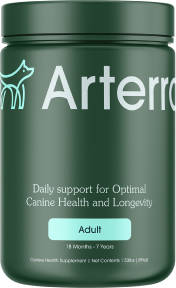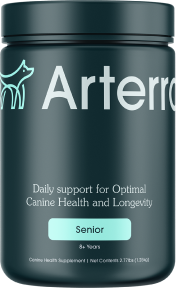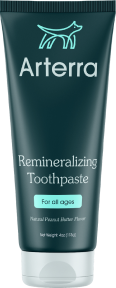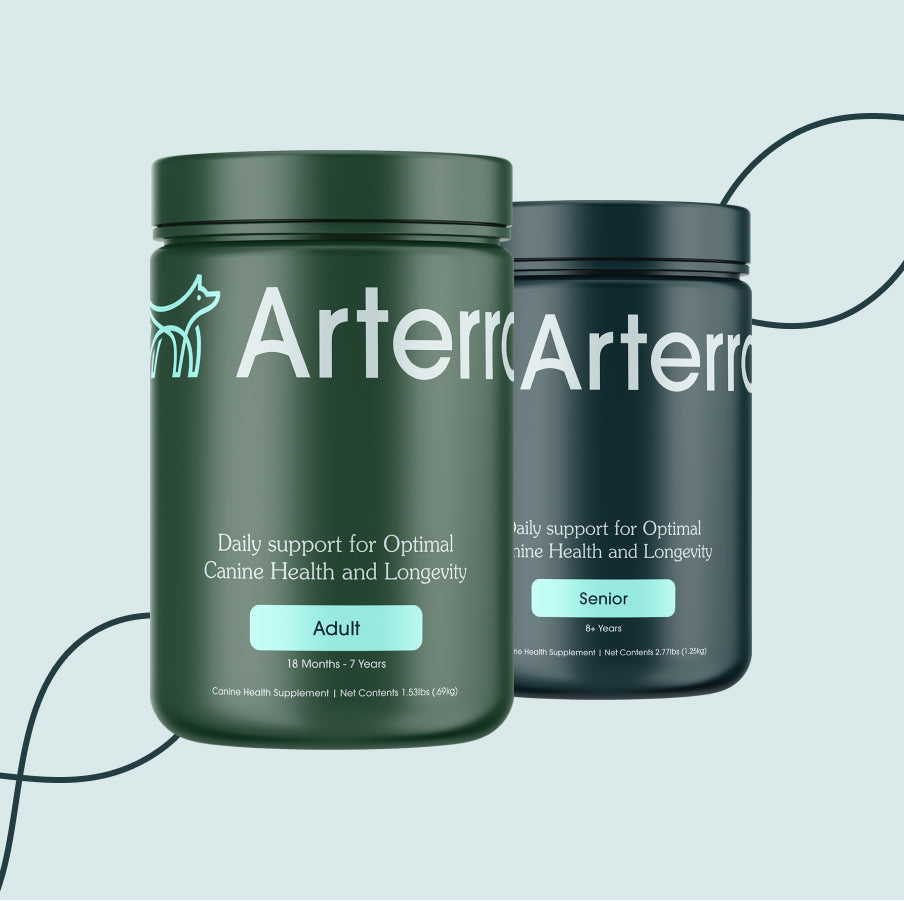After nearly two years of behind the scenes work, we launched Arterra last month – the first canine supplement specifically designed to increase canine healthspan. Earlier this week, pharmaceutical startup Loyal announced their plans to begin an FDA trial for a drug designed to increase lifespan in large dogs.
Given the strong overlap between our companies’ missions, my inbox was quickly flooded with inquiries about how our product compares to theirs. So I thought I’d write a post sharing my thoughts on the important similarities and differences between Arterra and Loyal’s approach.
First off, we have a ton of respect for the hard and expensive path Loyal is walking. Navigating FDA approval for a drug specifically intended to treat aging as a disease is important to veterinary medicine, but also has broad historical implications that can’t be overstated. Our hats off to them.
That said, our product differs significantly from theirs in several ways.
- Loyal’s product is a drug that may be approved and reach the market some years in the future. Ours is a veterinarian-formulated supplement that is available over-the-counter today.
- Their drug works on a single pathway: it lowers IGF-1, and by extension, lowers growth hormone.
- Our product is in some ways less sexy, but I think also intuitively more sound, with 63 ingredients formulated by leading integrative veterinarians (with extensive clinical experience and a strong research background at Purina) to support the entire body via multiple pathways simultaneously.
- We holistically support every key system in the body (joints, brain, heart, liver, gut, and immune system) with building blocks, inflammatory modulators, and other functional ingredients – i.e. “hardware support”.
- Simultaneously, we provide “software support” by gently activating several epigenetic pathways involved in the rate of aging, including:
- SIRT-1 (a major focus of Dr. David Sinclair’s work at Harvard) -- via trans-pterostilbene, resveratrol, and quercetin.
- AMPK -- via berberine, gynostemma pentaphylum, and others.
- Additionally, our product includes powerful anti-aging support via:
- Senolytic agents that increase the body’s ability to clear senescent (old and dysfunctional) cells.
- Reducing the formation of Advanced Glycation End Products (AGEs), which are especially in high in dogs fed a heat-processed kibble diet.
- Supporting the health of mitochondria (cellular powerplants) and inducing the growth of new ones via mitochondrial biogenesis.
- In our Senior formula, we also pair these approaches with support for the acute consequences of degenerative aging – chiefly: joint discomfort, cognitive decline, energy, and mood.
Questions and Musings on Loyal’s Approach
I also have some personal musings on Loyal’s approach, with the important disclaimer that I’m an informed layman, but not a veterinarian:
While there is strong directional data to support increased longevity, decreased cancer risk, and other benefits from lowering IGF-1, tinkering with IGF-1 is a double-edged sword that can have unintended consequences. Most notably – low IGF-1 can inhibit lean muscle mass and cause bodyfat gain.
Two relevant notes from my own background come to mind:
- The human bodybuilding community has long used IGF-1 / growth hormone modulation to enhance athletic performance and body composition. A quick Google search will reveal a wide body of clinical and anecdotal data of the perils of overshooting this important signaling molecule in either direction.
- Raising IGF-1/growth hormone levels is often employed in human functional medicine as an anti-aging mechanism to accelerate healing and recovery. Loyal’s drug is doing the opposite of this.
My personal concern is that, fundamentally, lowering IGF-1 below natural levels risks restricting a large dog’s body from growing and maintaining the amount of muscle that their skeletal system is designed for. I especially worry about this in large breeds (the target population for Loyal’s drug), who are prone to arthritis and hip dysplasia, since sarcopenia (muscle wasting) is one of the biggest contributors to its progression.
This doesn’t mean Loyal’s drug won’t work safely and as intended (and I hope it does); validating this is the purpose of FDA trials. In humans at least, there is absolutely a “sweet spot” to IGF-1/Growth Hormone modulation that can be achieved pharmaceutically, and I believe they’re likely onto something important here. But I absolutely want to see the safety data to validate it. Though if the trial fails, I expect it will be due to the aforementioned risks of oversuppressing IGF-1.
Comparing our approach with theirs, with our collective 63 ingredients I would bet on our formula to consistently increase canine healthspan over their single-mechanism pharmaceutical approach, though I still think there’s an important role for both approaches.
For absolute clarity, my critical questions are constructive in intent, from the perspective of a passionate dog owner and functional medicine/longevity nerd. They are in no way intended to impugn the incredibly difficult and impressive work of the team at Loyal. I don’t personally know them, but from everything I have observed they have my deepest respect and gratitude for simultaneously pushing the boundaries of both veterinary and longevity medicine, and I firmly believe there is an appropriate role for both of our company’s approaches.
Why isn’t Arterra also seeking FDA approval?
Notably, while our ingredients are science-backed and we’re currently enrolling patients for a clinical study focused on both safety and efficacy, most of our ingredients are naturally-derived molecules that cannot be patented. There is therefore no economic incentive or viable path to conventional FDA trials for our product, which would cost tens of millions of dollars.
And economics aside, our product is designed to provide multiple benefits within the body rather than treat a single condition, making it a poor fit for the nature of FDA trials and the design of US drug approval process. For these reasons, we are unambiguously a supplement, not a drug. And while this comes with some well-intended and generally reasonable regulatory restrictions on our marketing and speech, we are happy to remain that way.
All this said, we know our product works, have seen it firsthand in both clinical practice and through customer feedback, and are in the process of clinically validating it far beyond the standards of the supplement industry.
We’re confident in our product’s efficacy, and back it with a 100% money-back guarantee. If customers don’t see a positive difference in their dog, we’ll refund their money without hassle. Despite the necessarily high cost of our product, fewer than 1.5% of our customers to date have requested a refund, which I think speaks volumes.
Jonathan Willbanks
Founder & CEO


















